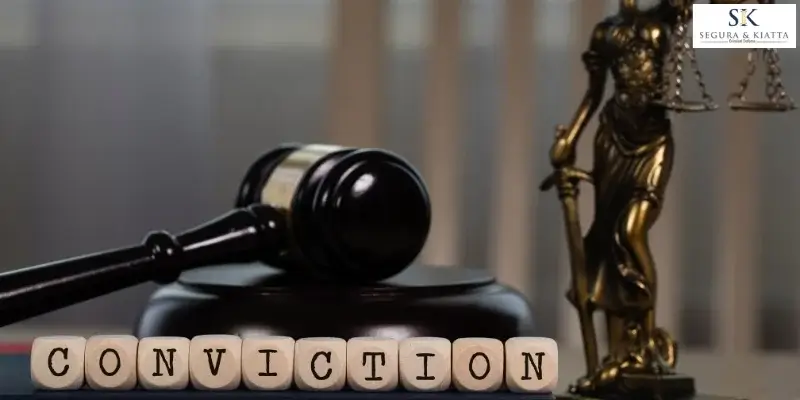|
|
Last Modified on Apr 09, 2025
In Texas, DWI consequences are swift and can be life-altering. While many DWI convictions are misdemeanors, if you have a felony conviction, you could face serious jail time. No matter your situation, you should know the consequences of a DWI conviction in Sugar Land and how to avoid them.
DWI Laws in Texas
In Texas, driving while intoxicated or impaired means driving under the influence of alcohol, drugs, or even prescription medications. That is why it is important to check the labels before consuming any prescription drugs, as mixing them with alcohol could prove disastrous. It is important to note that in Texas, DWI laws apply to drivers, pilots, boaters, and even amusement park operators.
If you are suspected of driving under the influence in Texas, an officer may stop you and administer a field sobriety test or a chemical test to determine your blood alcohol concentration (BAC). If your BAC is above 0.08, you are considered to be driving impaired. Further, if you fail your field sobriety test, you could also face charges.
Like all states, it is illegal to drive or consume any amount of alcohol if you are under 21 years old. If you are a minor and arrested for a DWI, you could face consequences like community service, fines, license suspension, and be ordered to enroll in a DWI education program.
Felony DWI
A felony DWI is the most serious DWI conviction. In Texas, felonies are classified in five ways: capital, first-degree, second-degree, third-degree, and state-jail. Most DWI felonies are sentenced as either second or third-degree felonies, which is very serious. Examples of felony DWIs include:
- Driving with a minor passenger, which in this case is someone under 15
- Intoxication manslaughter, which involves accidentally ending the life of someone because of impaired driving
- Intoxication assault, which involves seriously injuring another person because of impaired driving
- Having three or more DWI convictions
In Sugar Land, DWIs resulting in accidents are rare but significant enough to garner attention. In 2024, 37 of the 2,683 reported crashes were alcohol-related, according to the Sugar Land Police Department Annual Report. These cases would be considered DWI felonies if someone were seriously injured or killed.
Consequences of a DWI Conviction
Most first-time DWI convictions are counted as Class B Misdemeanors, which means serving up to 180 days in jail with a mandatory three-day sentence. This conviction may also result in paying up to $2,000 in fines. In addition, you could have your license suspended for a year, be ordered to install an ignition interlock device, and you may be required to take a DWI education class. In some cases, you may be ordered to serve probation in addition to or in lieu of jail time.
If it is your second DWI conviction, the charges increase. You could serve anywhere from a month to a year in jail and pay $4,000 in fines. A third or subsequent conviction is a third-degree felony and may result in spending 2-10 years in prison and paying up to $10,000 in fines.
Suppose your DWI is a second-degree felony, as in the case of intoxication manslaughter, you could face 2-20 years in prison per Penal Code Chapter 12, along with paying up to $10,000 in fines. Like all DWI convictions, felony convictions appear on your permanent record. This could significantly ruin your reputation with family and friends as well as impede your ability to obtain housing, employment, and educational opportunities, and you could lose professional licenses.
Avoiding DWI Consequences
If you are facing DWI charges, you want to avoid a conviction. Once you are convicted, it becomes more difficult to negotiate your sentencing, though not impossible. The optimal outcome is getting your case dismissed, or charges dropped completely, but this requires the skill and experience of a lawyer. Your DWI lawyer can investigate your case, challenge the evidence against you, and negotiate your sentence under certain conditions.
However, there are certain things you can do to improve your chances of success. First, you should exercise your right to remain silent if you are arrested, as well as your right to receive legal counsel. Before you are assigned a lawyer, you should avoid speaking to anyone about your case.
FAQs
Q: What Is the Optimal Way to Avoid Getting Charged With a DUI?
A: The optimal way to avoid getting charged with a DUI is to get your case acquitted before it goes to trial. The primary way that this is done is if you are innocent of the crime or if the evidence against you is proven invalid or unconstitutional. Your lawyer should be your primary resource for informing you how to avoid DUI charges.
Q: What Is the Most Likely Outcome of a First-time DUI?
A: The most likely outcome for a first-time DUI is being charged with a class B misdemeanor, which is the least serious DUI offense in Texas. A class B misdemeanor may result in paying a $2,000 fine and spending 72 hours in jail. In certain cases, you may serve probation instead of jail time, but that depends on your circumstances and your lawyer’s ability to negotiate your sentence.
Q: What Are the Odds of Winning a DMV Hearing?
A: The odds of winning a DMV hearing vary. Some factors that should be considered if you are concerned about winning a DMV hearing are the specific circumstances surrounding your case, whether the arrest was lawful, and your lawyer’s skill and experience. The DMV hearing is a civil proceeding that determines whether or not your license will be suspended.
Q: How Does a DWI Affect You?
A: A DWI can affect you in multiple ways. First, a DWI is a criminal charge that may appear on your record indefinitely. This can impact your ability to obtain employment, housing, educational opportunities, and certain licensing, and you may have your license suspended or revoked. Moreover, you could face jail time or pay hefty fines if you are convicted.
Contact a Qualified DWI Lawyer
Being charged with a DWI can change your life forever. One mistake or error in judgment can have serious, long-term consequences. To avoid facing these consequences and to ensure your freedom, it is wise to contact a lawyer at Segura and Kiatta today.




